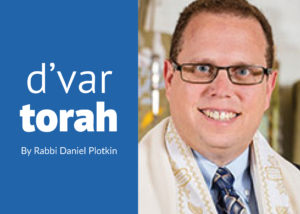
By Rabbi Daniel Plotkin
Parshat Shmini, unusual for a portion in Leviticus, begins with a narrative section. The Tabernacle is dedicated, and Aaron and his four sons are ordained as priests. During this ordination ceremony, Aaron’s oldest sons Nadav and Abihu bring some sort of improper sacrifice to the altar and God sends a fire that consumes them.
Aaron and his remaining sons (Aaron’s wife is not mentioned in the narrative) are of course devastated by this loss. Because of their position as priests, they are not allowed to tend to the burial of Nadav and Abihu. This creates tension and complication as this all occurs during the celebration of dedication and ordination.
At the end of the narrative, Aaron and his sons are supposed to have eaten of the sin offering brought as part of the ordination ceremony and then burn what remains. Moses finds out that the offering had been burnt without being eaten and in anger demands an explanation. Aaron says that they could not have eaten it in their state of mourning and loss, for God would not have approved. Moses accepts this explanation.
There is a striking similarity between the situation for Aaron and his surviving sons (and unmentioned wife) and what many in our world have experienced this past year. Part of the mourning process for Jews is to come together with loved ones and dear friends who provide comfort in the form of kindly words, food and simply being present. We have lost so many this year, and families have not had an opportunity to either say a final farewell to those they have lost or gather in traditional ways.
The example of Aaron shows how even in the moment of dedicatory celebration, Aaron and his family needed time and space to grieve. Being the High Priest did not change that. The pandemic does not change that for us either, and we need ways to work through our grief, even in ways that may be different from traditional ways.
Aaron initially stayed silent in the face of his loss, but then was compelled to speak. We too need to speak, to share, to be listened to, to remember. We have set times for mourning, shiva and sheloshim, but while these may structure our behavior, they do not necessarily contain our grief.
Zoom has made many of our traditional forms of mourning available to us, but it is not the same as the hug of a friend or sharing tears with a cousin. Using ceremonies such as stone dedications, the yahrtzeit and even taking a moment of memory at a future family event can give us the expression of grief that many need but have not been able to find.
In this time when our tradition in its fullness is not available to us, we can be like Aaron. We can take from the tradition and adapt it to our own situation. In this way, we can find our own path through the often lonely, and now even lonelier, path of grief.
Rabbi Daniel Plotkin is the rabbi educator at Temple Isaiah in Fulton.







